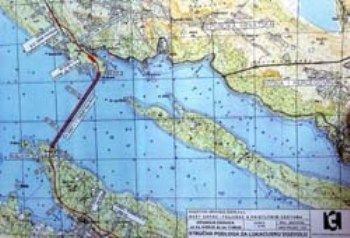


The Council of Ministers of Bosnia-Herzegovina has stated that the existing project for building a Komarna-Pelješac bridge is unacceptable, but the Bosnian government reiterates that it is willing to continue negotiations on the topic with Croatia.
In 2005, Croatia's Prime Minister Ivo Sanader formally opened construction works on what is to be the longest bridge in Croatia, one that will connect the southern Pelješac peninsula to the mainland. The purpose of the bridge is to connect the southernmost part of Croatia, cut off from the rest of the country at Neum, where neighbouring Bosnia-Herzegovina has a narrow outlet to the Adriatic Sea.
According to the existing project, the Pelješac Bridge, which is to be built off Bosnia's Neum, will be 2,300 meters long, 150 meters wide and 30 metres high, and the cost of construction is estimated at 250-300 million euros along with access roads. Since then, the Bosnian authorities have opposed this project, criticizing its height, which they say would impede Bosnia's access to the high seas.
"The current project does not guarantee that Bosnia will have unimpeded access to its territorial waters," Bosnian Transport and Communications Minister Branko Dokić told reporters in Sarajevo on Monday after the ministerial council discussed the issue and accepted a relevant report by an expert team in charge of analyzing the Pelješac bridge project.
Neither the ministerial council nor the expert team proposed any solution to Croatia, but Minister Dokić said that Bosnia was willing to continue the talks so as to find a solution acceptable to both countries.
"It is unquestionable that Croatia has the right to build a bridge on its territory, but it is also unquestionable that Bosnia can insist on free access to its territorial waters," Dokić said.
Asked by reporters, the Bosnian minister welcomed a recent proposal about building a bascule bridge as one of the alternatives to the existing project.
"If Croatia is in favor (of the bascule bridge), then it is a great step forward, and this will facilitate our efforts in Bosnia to reach a final agreement," Dokic said.
He added that both governments believed that the Pelješac Bridge should not be treated as a political problem but as an issue to be addressed by experts. (Hina)